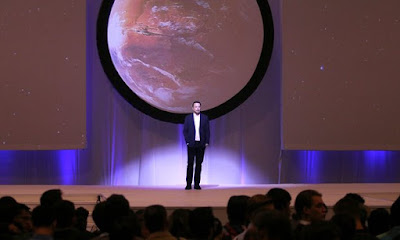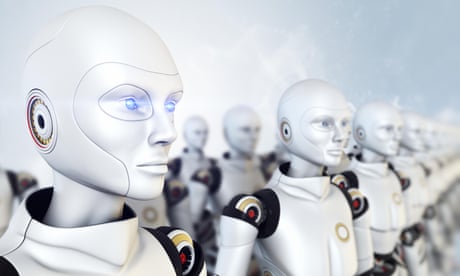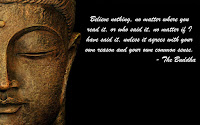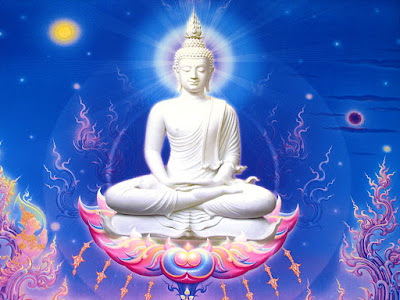 |
| Elon Musk believes we may be living in a simulated universe (Stringer/Reuters). |
Is our world a simulation? Why some scientists say it is more likely than not.
A swath of technologists and physicists believe that "simulation theory" will be "proved," just as it was proved that the Earth was not the center of the universe.
A swath of technologists and physicists believe that "simulation theory" will be "proved," just as it was proved that the Earth was not the center of the universe.
When Elon Musk isn’t outlining plans to use his massive rocket to leave a decaying Planet Earth and colonize Mars, he sometimes talks about his belief that Earth isn’t even real and we probably live in a computer simulation.
“There’s a billion to one chance we’re living in base reality,” he said at a conference in June.
The rise of robots: forget evil AI – the real risk is far more insidious
The rise of robots: forget evil AI – the real risk is far more insidious
 Musk is just one of the people in Silicon Valley to take a keen interest in the “simulation hypothesis,” which argues that what we experience as reality is actually a giant computer simulation created by a more sophisticated intelligence. If it sounds a lot like The Matrix, that’s because it is.
Musk is just one of the people in Silicon Valley to take a keen interest in the “simulation hypothesis,” which argues that what we experience as reality is actually a giant computer simulation created by a more sophisticated intelligence. If it sounds a lot like The Matrix, that’s because it is.
According to this week’s New Yorker profile of Y Combinator venture capitalist Sam Altman, there are two tech billionaires secretly engaging scientists to work on breaking us out of the simulation. But what does this mean? And what evidence is there that we are, in fact, living in The Matrix?
One popular argument for the simulation hypothesis, outside of acid trips, came from Oxford University’s Nick Bostrom in 2003 (although the idea dates back as far as the 17th-century philosopher René Descartes [the guy who famously deduced, "I think; therefore, I am").
In a paper titled “Are You Living In a Simulation?” Bostrom suggested that members of an advanced “posthuman” civilization with vast computing power might choose to run simulations of their ancestors in the universe.
This argument is extrapolated from observing current trends in technology, including the rise of virtual reality and efforts to map the human brain. More
Buddhism: Is the world real?
 |
| Question. Think for yourself: Kalama Sutra |
Would anyone suggest a serious discussion of mad man Elon Musk's "world as simulation" theory? Would it not worry a person why, whether the theory is true or not, the media is promoting it as a serious thing to discuss?
It may be true. Let's say it's true. Why is the misleading-media telling us? Why do they promote so many zombie-related stories? Something's amiss in their reporting. Whose ends are being served? Let's stay afraid, very afraid. That's where the money is. And don't ask too many questions, kid. You may not like the answers.
It may be true. Let's say it's true. Why is the misleading-media telling us? Why do they promote so many zombie-related stories? Something's amiss in their reporting. Whose ends are being served? Let's stay afraid, very afraid. That's where the money is. And don't ask too many questions, kid. You may not like the answers.
The ultimate truth -- in a Buddhist worldview -- is that all of this is maya, a grand illusion. For it is not at all what it seems to be. Wait, what does it seem to be?
Look around. Look at anything. It seems to last, to endure, to persist when it is really passing away. All things are hurtling toward destruction.
It (the world) seems to be able to satisfy our desires, our cravings for pleasure and for things to be not as they are, our wants when it is really disappointing, unfulfilling, and unsatisfactory again and again. (How many times are we going to fall for the lures it places before our eyes -- delightful sights, sounds, savories, scents, sensations, and ideas in our heads?)
It seems to be, but in fact investigation shows that it is impersonal. It is not us, not ours, not property we can possess or control. It is empty (devoid of pith, essence, like an onion of many misleading layers). There is definitely something here -- which we can list, analyze, and label the Five Groups we Cling to -- but it is not what it appears to be.
 |
| The Teaching-Buddha of the Future: Maitreya |
This is ultimate rather than conventional truth, and Elon Musk has not stumbled onto it. Musk is arguing that the unreal is unreal, whereas the Buddha was pointing out that even the real was unreal.
Is this the Grand Canyon or a picture of a Grand Canyon, and isn't it surprising that, ultimately speaking, the Grand Canyon is not what it appears to be. The Buddha called this realization seeing the Three Characteristics or Marks of Existence.
They mark all things (dharmas, conditioned phenomena). But there's one element not marked by these, not conditioned, not composed of parts like everything else, and therefore not falling away, unsatisfactory, and empty. And what is that? Nirvana.
How does one directly realize/experience that reality? Enlightenment. How does one get to the enlightenment the Buddha experienced? That's what Wisdom Quarterly has been talking from the onset. The short answer is that one cultivate serenity (jhana) and insight (prajna) by meditation (a calm and attentive mind) and mindfulness (nonjudgmental bare attention) as explained in the Four Foundations of Mindfulness Sutra.
The Buddha gave a remarkable analogy. Realizing the true nature of existence is like stumbling into a ghost town. A town is there, but no one's in it.
It actually means that everything's all right, all right just as it is. But it is not safe here. Therefore, strive to get to the further shore beyond this danger, beyond life and death. Nirvana is that further shore.
If this realization is not approached with wisdom (wise attention, instruction), calm, and balance, it can be very misleading, disorienting, depressing, scary, and confusing. This Dharma is for the wise not the foolish, for the contented not the greedy, for the kind not cruel.
For if this Teaching (distinguishing ultimate and conventional truth) is picked up like a mishandled snake, that is to say, if it wrongly grasped, it is likely to turn and and do one harm. But if rightly grasped, it leads to happiness here and now, happiness hereafter, and liberation from all suffering.
For if this Teaching (distinguishing ultimate and conventional truth) is picked up like a mishandled snake, that is to say, if it wrongly grasped, it is likely to turn and and do one harm. But if rightly grasped, it leads to happiness here and now, happiness hereafter, and liberation from all suffering.

































































































































































































































No comments:
Post a Comment